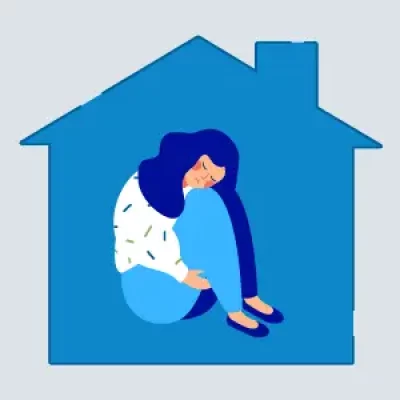Have you ever felt an overwhelming fear of leaving your house, being in crowded spaces, or unfamiliar environments?
If so, you may be experiencing agoraphobia and benefit from understanding agoraphobia treatments.
Agoraphobia is a type of anxiety disorder that can significantly impact your daily life. It is characterized by an intense fear of situations or places where escape may be difficult or embarrassing. This fear can often lead to avoidance behaviors, such as severely limiting your ability to leave home or participate in regular activities.
While there is no one-size-fits-all approach to treating this fear disorder, there are a variety of treatment options available that can help you manage your symptoms and improve your quality of life. In this blog post, we will discuss the different approaches, coping techniques, and treatment options available to ease your fears.
What is Agoraphobia? Causes and Symptoms
Agoraphobia affects approximately 1.3% of adults in the United States at some point in their lifetime. The exact cause of agoraphobia is unknown and believed to be due to a combination of factors (genetic, environmental, physical).
Potential causes of agoraphobia include:
-
- Genetics: If you have a family history of anxiety disorders, you may be more susceptible to developing agoraphobia.
-
- Traumatic experiences: A traumatic event, such as a car accident or physical assault, can trigger the development of intense fears.
-
- Major life changes: Significant life events, like divorce or job loss, can also increase your risk of developing fears that hold you back from living life fully.
Those with a family history of anxiety disorders are more likely to develop agoraphobia, and traumatic experiences or significant life changes can also contribute to its development.
Typical symptoms of agoraphobia include:
-
- Fear and anxiety: The most prominent symptom of agoraphobia is an overwhelming fear or anxiety in situations where escape may be difficult.
-
- Panic attacks: You may experience frequent panic attacks in feared situations, including rapid heart rate, shortness of breath, and dizziness.
-
- Avoidance behaviors: To avoid triggering your fears or anxiety, you may avoid certain places or situations altogether.
Other symptoms of agoraphobia may include:
-
- Panic attacks
-
- Excessive fear and anxiety in certain situations
-
- Shortness of breath or rapid heartbeat
-
- Dizziness or lightheadedness
-
- Nausea or stomach discomfort
-
- Trembling or shaking
-
- Feelings of detachment from oneself
-
- Fear of losing control or going crazy
It is important to talk to your doctor and licensed counselor to help determine if your symptoms are caused by agoraphobia or a physical health condition. Understanding your symptoms can help relieve some stress associated with this disorder.
Agoraphobia Treatments
Agoraphobia is a highly treatable condition, with many options available to help you manage your symptoms. There are several options for agoraphobia treatments, with the most improvement occurring when multiple options are used together.
Cognitive Behavioral Therapy (CBT)
CBT is a type of talk therapy that has been proven to be effective in treating agoraphobia. This approach helps you identify and change negative thought patterns and behaviors contributing to your fear and avoidance. Through CBT, you can learn how to challenge your fears, develop coping strategies, and gradually expose yourself to the situations you are afraid of.
Exposure therapy is a form of CBT that involves gradually exposing yourself to your fears in a safe and controlled environment. This therapy allows you to confront and overcome your fears, eventually reducing the anxiety associated with these situations. With the guidance of a therapist, you can slowly build up your tolerance for previously feared situations.
Medication
In addition to therapy, medication may also be recommended to help manage your symptoms and fears. Antidepressants, such as selective serotonin reuptake inhibitors (SSRIs), are commonly prescribed to help reduce anxiety and panic attacks associated with agoraphobia. It is important to note that medication should always be used in conjunction with therapy for long-term success.
Mindfulness and Relaxation Techniques
Practicing mindfulness and relaxation techniques can also be beneficial in managing your symptoms. These techniques help you stay present and focused on your surroundings, reducing feelings of anxiety and panic. Deep breathing exercises, meditation, and yoga are all effective ways to incorporate mindfulness and relaxation into daily life.
Coping Strategies
In addition to these treatment options, there are also coping strategies that you can implement to mitigate stress and fears. These coping strategies may include setting achievable goals, developing a support network, and having an emergency plan in place for when anxiety becomes overwhelming.
To further explore coping strategies and treatment options, talk to your counselor to learn more about what may work well for the symptoms you are experiencing.
Conclusion
Agoraphobia is a highly treatable condition usually experienced after trauma, a significant life change, or due to a family history of this disorder. Through a combination of agoraphobia treatments, you may see improvements in the severity of your symptoms and improve the quality of your life.
If you or someone you know is struggling with agoraphobia, reach out to a mental health professional for support and guidance on finding the right treatment plan.
For more information and resources on agoraphobia and other mental health concerns, call us at (833)-274-heal or schedule an appointment to start your mental health journey today.
Panic Attack Vs Anxiety Attack: 4 Key Differences To Tell Them Apart
How To Meditate For Anxiety: Discover The Top 4 Meditation Techniques To Help You Find Peace
What Is Somatic Therapy? A Holistic Approach To Anxiety And Trauma








